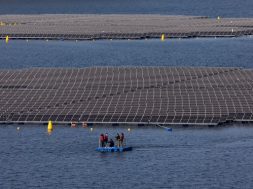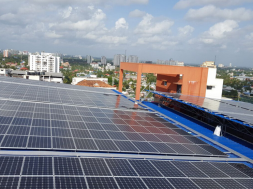
ReNew Power, UNEP, SEWA launch one-of-a-kind programme to train women salt pan workers as solar technicians – EQ Mag Pro
-
Unique initiative titled ‘Project Surya’ kicks off in Gujarat to address multiple Sustainable Development Goals in one shot, including No Poverty, Gender Equality, Affordable and Clean Energy, Decent Work and Economic Growth and Climate Action.
-
To train 1,000 women salt pan workers as solar panel and solar pump technicians, improving lives and enhancing livelihoods
Gurugram, India : In support of India’s clean energy transition, ReNew Power (ReNew) (NASDAQ: RNW, RNWWW), India’s leading renewable energy company, in partnership with the United Nations Environment Programme (UNEP) and Self-Employed Women’s Association of India (SEWA), launched a transformative initiative named ‘Project Surya’ to train low-income women salt pan workers to work in the renewable industry, the three partners said today.
Under this programme, women salt pan workers, who work in the physically challenging and extreme temperatures of the remote Rann of Kutch marshes, will be trained as solar panel and solar
pump technicians at Dhokavada village in the Patan district of Gujarat. Currently, these women save an average of ₹10,000 (US$ 128) in around 10 months, while a solar panel technician can earn up to ₹18,000 (US$ 130) a month.
This unique and inclusive project will address multiple Sustainable Development Goals under one umbrella, including No Poverty, Gender Equality, Affordable and Clean Energy, Decent Work, Economic Growth, and Climate Action
Commenting on the newly launched programme, Vaishali Sinha, Chief Sustainability Officer, ReNew, said, “This program brings these inspiring women, who face real hardship in a traditional
livelihood and earn a meagre income, into the heart of the clean energy transition to better their lives and brings them into the fight against climate change.
This program, that is scalable, is sustainability from the ground up, rather than top-down, and we are proud to partner with UNEP and SEWA to support this,” Vaishali added. “This is just one effort, and we need many more such multiple stakeholder programs across the corporate sector to accelerate the energy transition and, equally important, make it more just and diverse.”
Shombi Sharp, UN Resident Coordinator in India, commented, “How we produce energy is the greatest contributor to our climate crisis, accounting for 75% of all greenhouse emissions globally, with more than 80% of India’s population living in areas highly vulnerable to the consequences. Investments in renewables are not only good for those communities and the environment, but also generate jobs and social safety nets for the most vulnerable.
Team UN India is committed to supporting the clean energy transition for all, through multi-partner initiatives like this one, benefitting from India’s dynamic private sector and government leadership, and driving home the message that solutions to the Triple Planetary Crisis are within our reach.”
Atul Bagai, Head of India Office, UNEP said: “Evidence from around the world provides a strong case for supporting women-led renewable energy enterprises and supply chains to democratize access to electricity and build a low-carbon and resilient future. This initiative is an endeavour to leverage the unique and complementary strengths of our partners, ReNew Power and SEWA, to create strong replicable models that empower women for climate resilience and inclusive economic growth.”
Reema Nanavaty, SEWA, stated: “The green skills initiative will help SEWA move towards its 50 years resolve of building cleaner skies, cleaner air and cleaner water. We call it as Swachh Akash (clean skies). Even though small, collectively the carbon footprints will make a significant contribution. The younger generation members of SEWA will get decent work and a life of dignity and self-respect.”
The programme will start with training 60 women and, eventually, around 1,000 women will be skilled in the new clean energy transition roles. The programme will be supported by the Government of India’s National Skill Development Corporation.
ReNew is providing financial support and familiarization with its renewable facility in the area, while SEWA is the lead implementation partner. For its part, UNEP will be responsible for monitoring and evaluating the project.
US$1 = ₹78.15
About ReNew Power
ReNew is one of the largest renewable energy Independent Power Producers in India and globally. ReNew develops, builds, owns, and operates utility-scale wind and solar energy projects, and hydro projects. As of June 14, 2022, ReNew had a gross total portfolio of ~12.8 GW of renewable energy projects across India, including commissioned and committed projects.
As a part of ReNew’s focus on social responsibility, it supported the Gujarat government’s efforts with relief activities during the COVID-19 pandemic and provided ambulances, dry rations and PPE kits for several communities in the state. ReNew also provided blankets to the homeless during winters in the state via its ‘Gift Warmth’ campaign. In India, ReNew has impacted 650,000 lives across 10 states in over 250 villages with its various social responsibility initiatives.
About UNEP
UNEP is the leading global voice on the environment. It provides leadership and encourages partnership in caring for the environment by inspiring, informing and enabling nations and peoples
to improve their quality of life without compromising that of future generations
About SEWA
SELF EMPLOYED WOMEN’S ASSOCIATION (SEWA) is working with 1.8 million (2018) poor, self employed women workers from the informal economy across 18 states of India. With Guardian principles of Satya (truth), Ahinsa (non-violence), and Khadi (propagation of local employment and self-reliance), SEWA has been working for almost 5 decades to improve the livelihoods of poor self employed women workers from the informal economy through various initiatives using technology, technical training, microfinance, market linkages, natural resource management, affordable clean energy access etc. across 124 trades, with the twin goals of full employment and self-reliance.


















